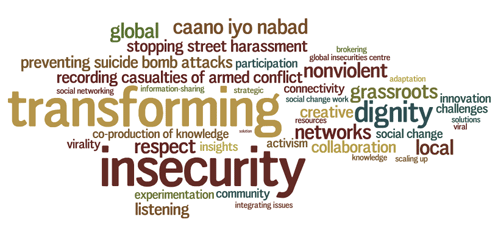
Dr Eric Herring, Research and Impact Director, School of Sociology, Politics and International Studies
How can international relations (IR) and security scholars have ‘critical impact’ in transforming unjust social relations and social practices? And what role does engagement with the Research Excellence Framework (REF) ‘impact agenda’ have in this?
The upcoming REF and the expectation that REF2020 will have a significantly larger impact component have created intense interest in the impact agenda. This issue is not specific to academia: after all, it relates centrally and explicitly to academia’s role in the wider world. The context for this agenda is one of vast global ferment: financial crisis, climate change, increasing inequalities, population growth and urbanisation, various forms of armed conflict, rapid technological advances and burgeoning social movements.
Some critical IR and security scholars are concerned that the REF impact agenda will squeeze the space for critical scholarship, either by marginalising those who do not engage with ‘impact’ or by subordinating those who do to processes which leave unjust social relations and practices intact and unacknowledged. They fear that resources, promotion and status will be channelled towards impact stars and that such stars will shine most brightly when they are fuelled by access to insider, elite policy processes rather than by engagement with the insecurities of wider and more local communities.
This concern was heightened by the strong message presented at the British International Studies Association annual conference in June 2013 that the REF impact agenda is essentially unproblematic, that all scholars have a public duty to do impact work and that failure to embrace impact as defined in the REF would be suicidal. On a panel at that conference I proposed the concept of ‘critical impact’ as a focal point for thinking about how critical IR and security scholars can interrogate, protect and promote their notions of what it means to be critical through, rather than simply against, the REF impact agenda.
It became clear to me that a workshop to explore the notion of critical impact and in particular collectively to agree a text on ‘The Case for Critical Impact’ for dissemination and discussion would be valuable. The resultant workshop took place in the Global Insecurities Centre of the School of Sociology, Politics and International Studies (SPAIS) at the University of Bristol on 12 September. My fellow participants were:
- Jutta Weldes: Professor of International Relations, SPAIS. Co-investigator on the Transforming Insecurity project. Among many other things, Jutta’s current work focuses on conceptualising everyday insecurities.
- Latif Ismail: 2012 nominee for the posts of Somali Foreign Minister and National Security Adviser to the President. Adviser to NATO, FCO, MoD and EU. Executive Director, Transparency Solutions consultancy. Research Associate on the Transforming Insecurity project.
- Milja Kurki: Professor in IR Theory and Impact Director, Department of International Politics, University of Aberystwyth. PI on the ERC-funded ‘Political Economies of Democratisation’ scholar-practitioner knowledge exchange.
- Ryerson Christie: Lecturer in East Asian Studies, SPAIS. Author, ‘Critical Voices and Human Security: To Endure, Engage or Critique’, Security Dialogue, 41, 169-90/ CI, European Commission 7th Framework VUELCO multidisciplinary project with stakeholders on volcanoes and risk mitigation.
- Karen Desborough: SPAIS PhD candidate on the global movement against street sexual harassment of women. Research Assistant on the Transforming Insecurity project. Manager, EU-funded SCOOP project on integrating socio-economic and humanities research into policy 2009-12.
- Saskia Walcott was a participant observer: Head of Communications & Public Engagement, ESRC 2003-10. Director, Walcott Communications communication and knowledge exchange company.
Several other colleagues were unable to attend the workshop but are involved in the editing of the document.
We agreed on the significant risks and limitations but, crucially, also on the significant opportunities and benefits presented by the impact agenda. The academic participants in the workshop had had both positive and negative experiences in their efforts to achieve critical impact. Some participants are involved in research which bridges scholarship and practice through knowledge exchange and knowledge co-production. Some have been involved directly in practitioner activities. The discussion and initial drafting involved negotiation around the multiple understandings of what it means to be critical, the multiple meanings of impact (see the HEFCE definition, which is very broad) and their multiple possibilities and limitations. It goes without saying that these issues of critical impact are not exclusive to IR and security studies. The concept of critical impact could (and should?) resonate across disciplinary boundaries.
By the end of the day we had drafted the key points of our text on ‘The Case for Critical Impact’ and this document is currently being refined by the wider group. We aim to have an agreed text ready for circulation and discussion by the end of October, which we will share on this blog and elsewhere. Our text is intended as a first word rather than the last word – the start of a wider conversation that will feed positively into the discussions regarding the REF, into impact practices and into the sense of solidarity and confidence among critical scholars within and beyond critical IR and security.
Dr Eric Herring is Principal Investigator for the ESRC-funded project on Transforming Insecurity through Nonviolent Grassroots Networks, Global Insecurities Centre. @eric_herring

